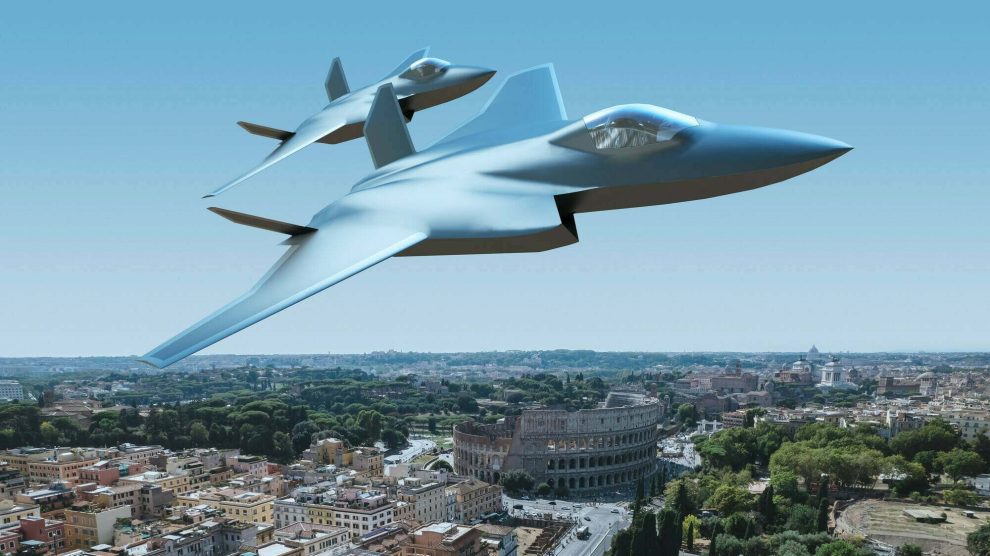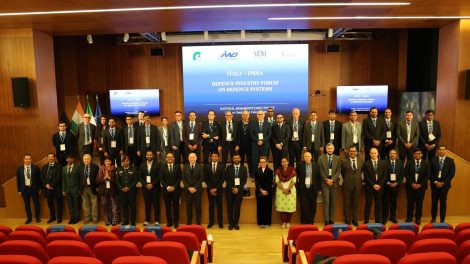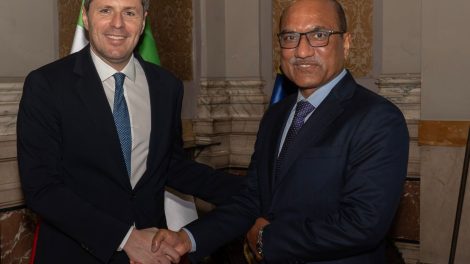Trilateral meeting progresses GCAP talks. On Tuesday, Defence Minister Guido Crosetto welcomed his British homologue Grant Shapps and the Special Adviser to the Japanese Minister of Defence Yoshiaki Wada in Rome. Their meeting focussed on the Global Combat Air Programme – through which the three countries seek to develop the sixth-generation fighter jet – and laid the foundation for the signing of the treaty that will kickstart it, which the Italian minister said would happen in Tokyo before the end of 2023.
- “We are working together to ensure that the GCAP incorporates the best technologies and capabilities of Italy, Japan and the UK,” noted Minister Crosetto, describing it as a “trilateral project based on equal participation in terms of costs and benefits and on the sharing of the best technologies between our three countries.”
The progression so far. Tuesday’s meeting followed a previous trilateral in September, held in London between Minister Crosetto, James Roger Cartlidge, UK Minister of State for Defence Procurement, and Kiyoshi Serizawa, Vice-Minister of Defence of Japan. It happened on the sidelines of the DSEI defence and aerospace exhibition, where the three industrial project leaders – Italy’s Leonardo, the UK’s BAE Systems and Japan’s Mitsubishi Heavy Industries – agreed on the steps to deliver the concept phase.
- Previous trilaterals were also held in June (in Rome, between Minister Crosetto, then-British Defence Minister Ben Wallace and the Japanese Deputy Defence Minister Atsuo Suzuki) and in March (in Tokyo, where Ministers Crosetto and Wallace met with their counterpart Yasukazu Hamada, the predecessor of the current Minister, Minoru Kihara).
A future-proof fighter jet. The GCAP is about developing an integrated air combat system in which the main platform – the aircraft itself and the human pilot – is at the centre of a network of remotely piloted aircraft with different roles and tasks, from reconnaissance to combat support, all controlled by the central node and inserted into an ecosystem capable of multiplying the effectiveness of the system itself.
- The entire capability package will be able to exchange real-time data and coordinate with assets across all domains (land, sea, air, space and cyberspace), thus providing decision-makers with a complete and constantly updated picture of the battlespace, multiplying their capacity to analyse scenarios and adapt decisions to changing events.
It’s a political project too. The programme was launched in December 2022, when the governments of Rome, London and Tokyo agreed to jointly develop a next-generation air combat platform by 2035. In the joint memorandum, the leaders of the three countries emphasised their respective commitment to upholding the free and open, rules-based international order in defence of democracy – which in turn requires “strong defence and security partnerships, underpinned and strengthened by a credible deterrent capability.”
- Rome, London and Tokyo also aim to accelerate their advanced military capabilities and technological edge through this project, and envision positive knock-on effects for the wider industry.
The Saudi issue… In August, the Financial Times revealed that Riyadh was pushing to become a full partner in GCAP. The project’s expansion was discussed during the Tuesday meeting. However, Decode39 understands – based on the reluctance of its sources when asked about this – that Saudi Arabia’s possible involvement remains taboo. The UK is open to the idea, but Japan is strongly opposed. And recently, Leonardo CEO Roberto Cingolani stated that the GCAP was “UK, Japan and Italy. That’s all.”
- The overheating of the Israeli-Palestinian crisis in the wake of the October 7 Hamas attack in the south of the Jewish State could be an additional obstacle to Saudi involvement.
Germany on the sidelines? According to The Times, Berlin is about to pull out of a rival programme – the Franco-German Future Air Combat System, or FCAS – and is negotiating with London to join the GCAP. Germany is reportedly using the UK’s negotiations to sell 48 Eurofighters to Saudi Arabia (and would be ready to lift its veto on the matter) to get the British green light on the programme.
- However, such a decision could lead to an unprecedented deterioration in relations between France and Germany, and perhaps even with the UK, just two years after the AUKUS nuclear submarine alliance angered Paris by upending its plans with Australia.





